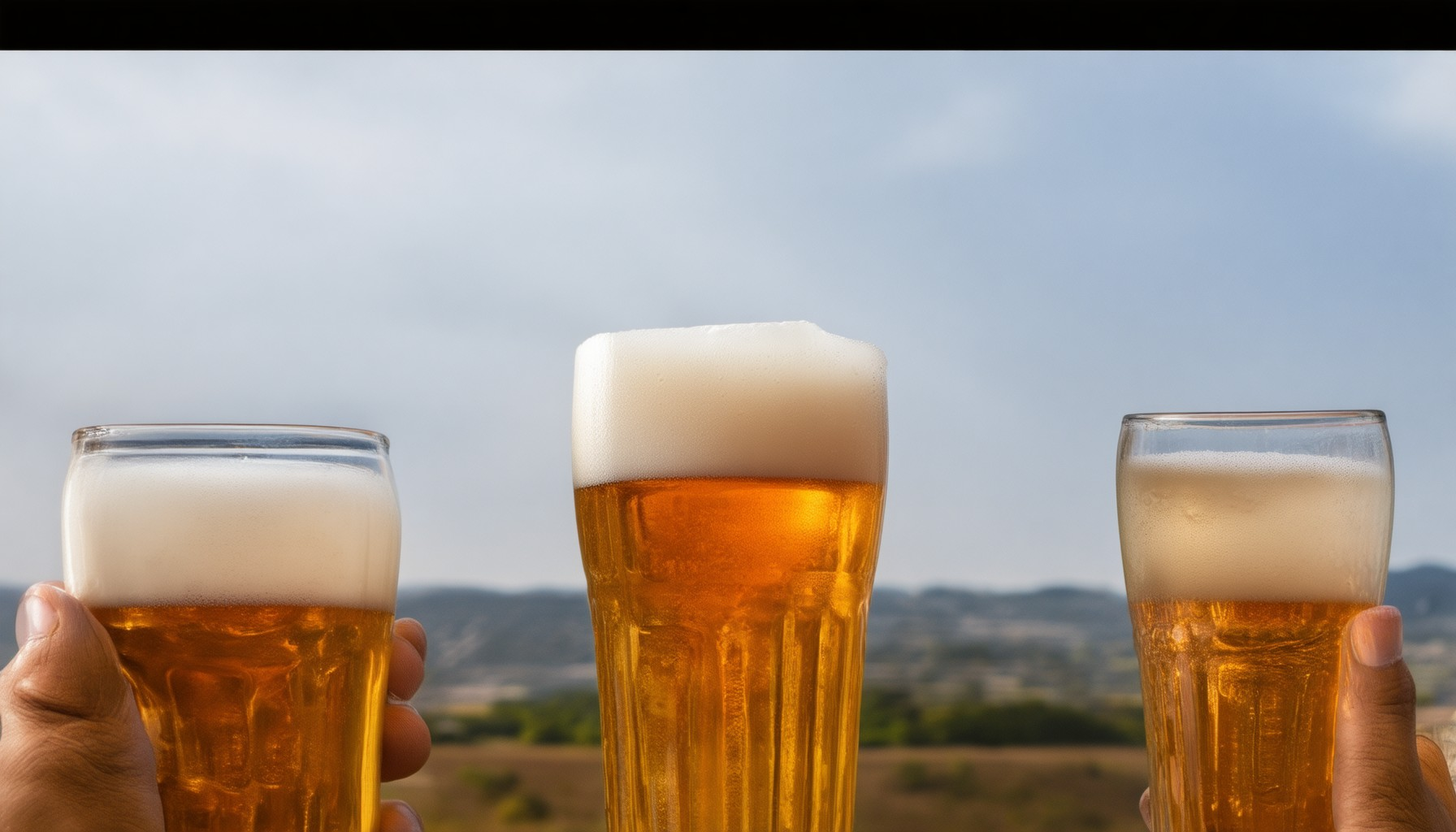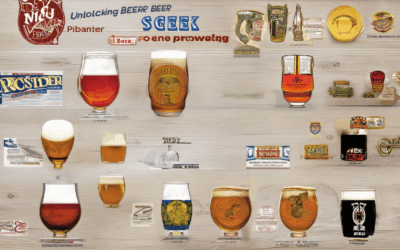Did you ever stop to think about the hidden complexities of beer beyond its refreshing taste? From its impact on health to its cultural significance, beer has long been a subject of fascination and debate. Exploring the fascinating beer functions, this article delves into the lesser-known benefits and enduring myths surrounding this beloved beverage. While beer has often been stereotyped as merely a social or indulgent drink, recent research reveals intriguing insights into its potential health benefits and how it interacts with our bodies. However, not all claims are backed by science, so we’ll separate fact from fiction to uncover the true functional side of beer. Whether you’re curious about its effects on muscle growth, testosterone levels, or overall well-being, this article offers a comprehensive exploration of beer’s diverse roles. Join us as we unravel the fun facts, health implications, and cultural contexts that make beer a multifaceted subject of interest.
Key Takeaways
- Beer’s impact on testosterone is debated; understanding its role in hormone regulation requires considering factors like cortisol, estrogen conversion, and liver health.
- Moderate beer consumption may support stress reduction and social well-being, indirectly contributing to hormone balance.
- Specific beverages like pomegranate juice and whey protein can aid in supporting testosterone levels when incorporated into a balanced diet.
- Beer’s effect on muscle growth is neutral; moderation is crucial to avoid negative effects such as fat retention and inhibited protein synthesis.
- Evaluating beer’s role in hormone and muscle health necessitates considering liver health and overall dietary patterns.
- Always practice moderation and seek professional advice for personalized insights into beer’s functional benefits and potential risks.

Are There Any Benefits to Drinking Beer?
Yes, there are several potential benefits to drinking beer in moderation. Here are some key points:
- Improved Cardiovascular Health: Moderate consumption of beer may help reduce the risk of cardiovascular diseases due to its contents of antioxidants and polyphenols.
- Cognitive Benefits: Some studies suggest that moderate alcohol intake, including beer, may improve cognitive function and reduce the risk of dementia in older age.
- Social Bonding: Beer is often a social beverage, fostering connections with friends and family during gatherings and celebrations.
- Antioxidant Properties: Beer contains antioxidants that can contribute to overall health and may help combat oxidative stress.
- May Reduce Risk of Certain Diseases: Research indicates that moderate beer consumption can lower the risk of developing conditions like type 2 diabetes and certain cancers.
Additionally, craft beer offers a wide variety of flavors and nutritional profiles, catering to different tastes and dietary needs. However, it’s important to remember that moderation is key, as excessive alcohol consumption can lead to negative health effects.
For more information on the health benefits of beer and responsible consumption, visit the CDC or consult a healthcare professional.
What are the 3 C’s of beer?
The 3 C’s of beer pairing are Cut , Complement , and Contrast . These principles guide harmonious and enjoyable pairings:
- Cut : This refers to the balance between the acidity of beer and the richness of food. A lighter beer pairs well with delicate dishes, while a robust beer complements hearty meals.
- Complement : This involves matching flavors. For example, a hoppy IPA pairs perfectly with citrusy foods, while a malty stout complements earthy dishes.
- Contrast : This creates a dynamic balance. A bitter beer can contrast nicely with a sweet dessert, or a smooth cream ale can complement a spicy dish.
Understanding these principles helps create a more enjoyable dining experience. Explore more tips on beer pairing at The Goods On Tap .

What is the Function of Beer?
Brewed from fermented malted grains, beer is a popular alcoholic beverage enjoyed worldwide for its rich flavors and social significance. Its primary function revolves around its production, which involves converting sugar into alcohol through fermentation. Here’s a breakdown of its key aspects:
Historical and Cultural Significance
Beer has been a staple in human culture for thousands of years, dating back to ancient civilizations like Mesopotamia and Egypt. It plays a significant role in cultural traditions, celebrations, and even religious rituals in many societies.
Nutritional Profile
Beer contains essential nutrients such as vitamins (like B vitamins), minerals (e.g., magnesium, zinc), and antioxidants, particularly from hops. These components may contribute to overall health benefits.
Types and Varieties
Beer comes in various forms, including lagers, ales, stouts, porters, wheat beers, and IPAs. Each type has unique flavor profiles and brewing methods, catering to different tastes and preferences.
Health Implications
While moderation is key, beer can offer potential health benefits, such as:
- Supporting cardiovascular health due to antioxidants and other compounds.
- May aid in bone health by promoting calcium absorption.
- Could have anti-inflammatory properties, potentially aiding in conditions like arthritis.
Production Process
Beer production involves several steps: malting, boiling, fermenting, and conditioning. Malt is sprouted and dried, then mixed with water and yeast to initiate fermentation. Hops are added during the boil to provide bitterness and flavor.
Social and Recreational Use
Beer is widely consumed socially, often in pubs or at home. It serves as a relaxant and social lubricant, fostering connections among people.
For a deeper dive into the craft beer scene, explore The Goods On Tap , your go-to resource for brewery reviews, beer trends, and industry insights.

Does Beer Increase Testosterone?
Beer, as a product containing alcohol, has been a subject of interest regarding its potential effects on hormones. While moderate alcohol consumption has been explored for various health outcomes, the impact on testosterone levels remains a topic of debate.
The Role of Alcohol in Hormone Regulation
Alcohol consumption can influence hormone levels, particularly through its effects on the endocrine system. Here are key factors to consider:
- Cortisol Release: Alcohol intake can trigger the release of cortisol, a stress hormone. Elevated cortisol levels may suppress testosterone production over time.
- Estrogen Conversion: In some cases, alcohol can interfere with the conversion of androgens to estrogens, potentially impacting testosterone dynamics.
- Liver Health: Chronic alcohol consumption can strain the liver, which plays a role in hormone metabolism. Poor liver function may hinder testosterone regulation.
Potential Benefits of Moderate Beer Consumption
While the overall impact of beer on testosterone is nuanced, some studies suggest that moderate alcohol intake might offer benefits, though these should be viewed with caution:
- Reducing Stress: Moderate alcohol consumption may help reduce stress, which can indirectly support hormone balance.
- Social Factors: The social aspect of consuming beer may contribute to a sense of well-being, potentially influencing hormone-related behaviors.
Risks and Considerations
It’s crucial to recognize that the relationship between beer and testosterone is complex and not fully understood. Excessive alcohol consumption is linked to:
- Liver Damage: Chronic alcohol abuse can lead to liver cirrhosis, impairing the body’s ability to regulate hormones effectively.
- Hormonal Imbalance: Overconsumption of alcohol can disrupt the delicate balance of hormones, including testosterone.
- Reduced Libido: High alcohol intake is often associated with reduced sexual desire, which may relate to testosterone levels.
Conclusion
While there may be anecdotal reports linking beer to increased testosterone, the evidence is not conclusive. The impact of beer on testosterone levels appears to depend heavily on factors such as consumption frequency, overall health, and individual biology. Moderation is key, as excessive alcohol consumption poses significant health risks.
Best Drinks for Testosterone Support
Supporting testosterone levels can be achieved through a balanced diet and specific beverages. Here are some drinks that may aid in promoting healthy testosterone levels:
- Pomegranate Juice : Known for its high antioxidant content, pomegranate juice may support cardiovascular health and potentially enhance testosterone production. Opt for pure, unsweetened versions to avoid added sugars.
- Green Tea : Rich in antioxidants like EGCG, green tea may help regulate hormones by reducing the conversion of testosterone to estrogen. However, moderate consumption is advised to avoid disrupting sleep patterns due to caffeine.
- Whey Protein Shake : As part of a fitness routine, whey protein shakes can provide essential amino acids necessary for hormone production and muscle maintenance. They are often used by individuals looking to boost muscle growth and support testosterone levels.
- Vitamin D Fortified Beverages : Low vitamin D levels have been linked to lower testosterone. Drinks fortified with vitamin D can help maintain optimal hormone levels, particularly in regions with limited sunlight.
- Bee Pollen : Traditionally used in holistic health practices, bee pollen is rich in nutrients and may support hormonal balance. It’s often consumed as a powder mixed into drinks or smoothies.
- Apple Cider Vinegar : Known for its detoxifying properties, apple cider vinegar may contribute to overall health, indirectly supporting testosterone levels. Dilution is recommended due to its acidity.
While these drinks may offer benefits, it’s important to maintain a well-rounded diet and consult with a healthcare professional before making significant dietary changes, especially if you have underlying health conditions or are taking medications.

Is Beer Bad for Muscle Growth?
Beer may not be inherently bad for muscle growth, but its effects depend on several factors:
- Alcohol Content: High alcohol intake can inhibit protein synthesis, slowing muscle growth. Excessive consumption may lead to fat retention and hinder progress.
- Carbohydrates: Beer contains simple sugars that can boost energy levels during workouts but may promote fat gain if consumed in excess.
- Nutrients: Beer provides vitamins (like B vitamins) and minerals that support muscle function and recovery. Moderate consumption may aid in reducing muscle soreness.
However, the overall impact of beer on muscle growth is neutral when consumed in moderation. Its effects vary based on individual health, exercise habits, and diet.
Considerations
For individuals with certain health conditions, such as liver disease or diabetes, excessive beer consumption may exacerbate muscle-related issues. Moderation is key for optimal muscle growth and health.
Conclusion
Brewers recommend enjoying beer responsibly as part of a balanced diet and active lifestyle. While it may not directly harm muscle growth, its impact is influenced by portion size, frequency, and overall dietary choices.





0 Comments